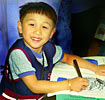Teacher Resources and Support Strategies for Overwhelmed Educators

Check out our blog for social-emotional learning articles, news, and more!
 Drugli, M.B., Larsson, B., Clifford, G., and Fossum, S. (2006). Pervasive and non-pervasive conduct problems in a clinic sample aged 4-8 years: child, family and day-care/school factors. Regional Centre for Child & Adolescent Mental Health, Department of Neuroscience, Norwegian University of Science and Technology, N-7489 Trondheim, Norway.
Drugli, M.B., Larsson, B., Clifford, G., and Fossum, S. (2006). Pervasive and non-pervasive conduct problems in a clinic sample aged 4-8 years: child, family and day-care/school factors. Regional Centre for Child & Adolescent Mental Health, Department of Neuroscience, Norwegian University of Science and Technology, N-7489 Trondheim, Norway.
In this study differences between pervasive (home and day-care/school) versus non-pervasive conduct problems (home only) were examined in regard to various child, parent/family and day-care/school characteristics in an outpatient clinic sample of 120 children aged 4-8 years. All children in this sample scored above the 90th percentile on the Eyberg Child Behavior Inventory (ECBI) for home problems, and met the criteria for a possible or a confirmed diagnosis of oppositional defiant behaviours. The proportion of children with pervasive conduct problems was high, 83%. Teachers in day-care and school reported children in the pervasive group to have significantly more attention and internalizing problems as well as lower social competence scores than those in the non-pervasive group. Children in the pervasive group also showed consistently more problems in their relationships both with teachers and peers than those in the non-pervasive group. The implications for assessment and treatment of children with conduct problems in these age-groups are discussed.





